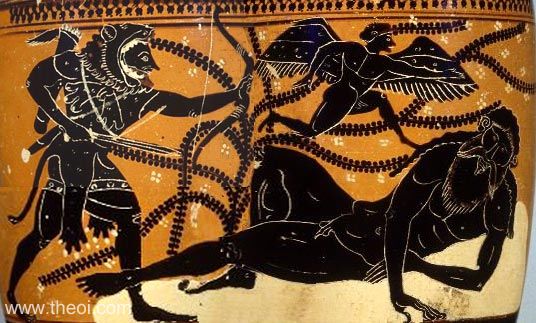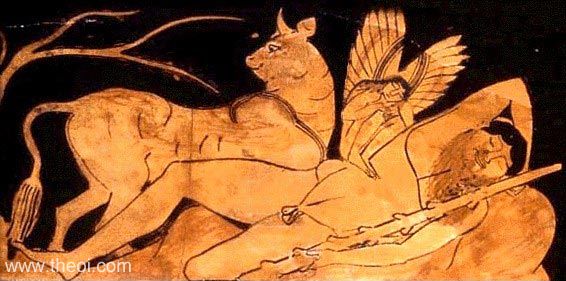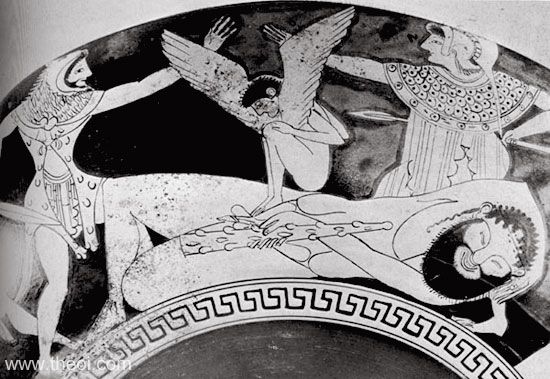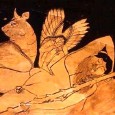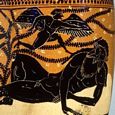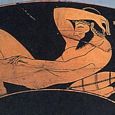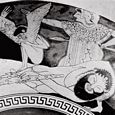ALCYONEUS (Alcyoneus) - King of the Thracian Giants of Greek Mythology (original) (raw)
Greek Mythology >> Bestiary >> Giants >> Gigantes >> Alcyoneus (Alkyoneus)
ALKYONEUS
Transliteration
Alkyoneus
Translation
Strong-?, Kingfisher
Heracles, Alcyoneus and Hypnus, Athenian black-figure lekythos C6th B.C., Toledo Museum of Art
ALKYONEUS (Alcyoneus) was the King of the Thrakian Gigantes (Giants) who was immortal within the confines of his homeland of Pallene.
Herakles encountered Alkyoneus during his travels. He sneaked up upon the giant as he slept and disabled him with a volley of arrows and blows from his club. The hero then dragged the wounded giant beyond the confines of Pallene where he died. Alkyoneus' seven mourning daughters were transformed into a flock of kingfishers (Greek alkyones).
The etymology of the giant's name is unclear. Several stories connect Alkyoneus with the kingfisher bird (alkyôn), and his brother Porphyrion was apparently named for the purple-coot. However it is more likely that his name is prefixed with the word _alk_- "the strong" as most of the Gigantes possess warlike names.
Alkyoneus may be the same as Eurymedon, a king of the Gigantes mentioned in the Odyssey.
FAMILY OF ALCYONEUS
PARENTS
[1.1] GAIA & the blood of OURANOS (Hesiod Theogony 176, Apollodorus 1.34)
[1.2] GAIA (Greek Lyric V Anonymous Frag 985)
OFFSPRING
[1.1] THE ALKYONIDES (Hegesande Memoirs Frag, Suidas s.v. Alkyonides)
ENCYCLOPEDIA
ALCY′ONEUS (Alkuoneus). A giant, who kept possession of the Isthmus of Corinth at the time when Heracles drove away the oxen of Geryon. The giant attacked him, crushed twelve waggons and twenty-four of the men of Heracles with a huge block of stone. Heracles himself warded off the stone with his club and slew Alcyoneus. The block, with which the giant had attempted the life of Heracles, was shewn on the Isthmus down to a very late period. (Pind. Nem. iv. 44, with the Schol.) In another passage (Isth. vi. 45, &c.) Pindar calls Alcyoneus a Thracian shepherd, and places the struggle with him in the Phlegraean plains.
Source: Dictionary of Greek and Roman Biography and Mythology.
CLASSICAL LITERATURE QUOTES
Alcyoneus and Hypnus god of sleep, Athenian red-figure krater C5th B.C., The J. Paul Getty Museum
Pindar, Nemean Ode 4 str 4 (trans. Conway) (Greek lyric poet C5th B.C.) :
"[Herakles] slew the Meropes and that great man of war, giant of terror, Alkyoneus (Alcyoneus); yet not before with rocks his only weapon, he felled twelve four-horse chariots, and the men who bestrode them twice the number, proud horsemen all."
Pindar, Isthmian Ode 6 str 2 :
"And on that shepherd in stature like a mountain, Alkyoneus (Alcyoneus), meeting with him at Phlegra, Herakles spared not of his strength to loose the sounding music of his bowstring."
Greek Lyric V, Anonymous, Fragment 985 (from Hippolytus, Refutation of all the Heresies) (trans. Campbell) (Greek lyric B.C.) :
"Ge (Gaea, the Earth), say the Greeks, was the first to produce man . . . But it is hard to discover [who] . . . was the first of men to appear . . . [whether it was the earth of] Pellene to Phlegraian Alkyoneus (Phlegraean Alcyoneus), eldest of the Gigantes (Giants)."
Pseudo-Apollodorus, Bibliotheca 1. 34 (trans. Aldrich) (Greek mythographer C2nd A.D.) : "Herakles first sent an arrow at "Alkyoneus (Alcyoneus), who by falling to the earth recovered somewhat. Athene advised Herakles to drag him outside of Pallene, which he did, and Alkyoneus thereupon died."
Nonnus, Dionysiaca 25. 85 ff (trans. Rouse) (Greek epic C5th A.D.) :
"Bakkhos (Bacchus) [Dionysos] repaid the stubble of snakehaired Gigantes (Giants), a conquering hero with a tiny manbreaking wand, when he cast the battling ivy against Porphyrion, when he buffetted Enkelados (Enceladus) and drove Alkyoneus (Alcyoneus) with a volley of leaves: then the wands flew in showers, and brought the Gegenees (Earthborn) down in defence of Olympos."
Nonnus, Dionysiaca 48. 6 ff :
"[Gaia the Earth] goaded her own sons to battle : ‘My sons, make your attack with hightowering rocks . . . [and I will] bestow Hebe on Porphyrion as a wife, and give Kythereia (Cytherea) [Aphrodite] to Khthonios (Chthonius), when I sing Brighteyes [Athene] the bedfellow of Enkelados (Enceladus), and Artemis of Alkyoneus (Alcyoneus) . . .’
With these words she excited all the host of the Gigantes (Giants)."
Heracles, Alcyoneus, Hypnos and Athena, Athenian red-figure kylix C5th B.C., National Gallery of Victoria
Nonnus, Dionysiaca 48. 6 ff :
"Bakkhos (Bacchus) [Dionysos] held a bunch of giantsbane vine [in the war of the Giants], and ran at Alkyoneus (Alcyoneus) with the mountain upraised in his hands : he wielded no furious lance, no deadly sword, but he struck with this bunch of tendrils . . . Vast Alkyoneus leapt upon Lyaios (Lyaeus) armed with his Thrakian crags; he lifted over Bakkhos a cloudhigh peak of wintry Haimos (Haemus)--useless against that mark, Dionysos the invulnerable. He there the cliff, but when the rocks touched the fawnskin of Lyaios (Lyaeus) [Dionysos], they could not tear it, and burst into splinters themselves."
Nonnus, Dionysiaca 36. 241 ff :
"Nine cubits high, equal to Alkyoneus (Alcyoneus)."
[N.B. A cubit is about 45cm or 1 1/2 feet, so the giant was approximately 4 meters or 13 1/2 feet tall.]
Suidas s.v. Alkyonides (trans. Suda On Line) (Byzantine Greek Lexicon C10th A.D.) :
"Hegesande tells the myth about them [the Alkyonides (Alcyonides)] in his Memoirs as follows. They were the daughters of the giant Alkyoneus (Alcyoneus) : Phosthonia, Anthe, Methone, Alkippa (Alcippa), Pallene, Drimo, Asterie (Asteria). After the death of their father they threw themselves into the sea from Kanastraion (Canastraeum), which is the peak of Pellene, but Amphitrite made them birds, and they were called Alkyones from their father. Windless days with a calm sea are called Alkyonides [i.e. Halcyon-days]."
ANCIENT GREEK ART
L1.2 Alcyoneus & Hypnus
Athenian Red Figure Vase Painting C5th B.C.
L1.4 Heracles, Alcyoneus, Hypnus
Athenian Black Figure Vase Painting C6th B.C.
L1.1 Heracles & Alcyoneus
Athenian Red Figure Vase Painting C6th B.C.
L1.3 Heracles, Alcyoneus, Hypnus
Athenian Red Figure Vase Painting C5th B.C.
SOURCES
GREEK
- Pindar, Odes - Greek Lyric C5th B.C.
- Greek Lyric V Anonymous, Fragments - Greek Lyric B.C.
- Apollodorus, The Library - Greek Mythography C2nd A.D.
- Nonnus, Dionysiaca - Greek Epic C5th A.D.
BYZANTINE
- Suidas, The Suda - Byzantine Greek Lexicon C10th A.D.
BIBLIOGRAPHY
A complete bibliography of the translations quoted on this page.
